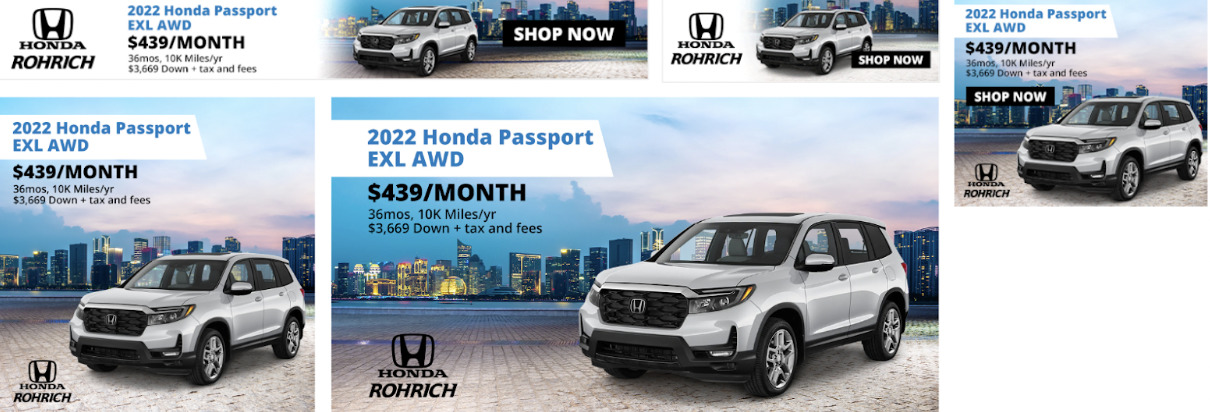Digital Display Ads
To start, what exactly are Digital Display Ads? They are a type of online advertisement that combines text, images, and a URL that links to a website where a customer can learn more about or buy products.
Marketers use digital display ads across the entire buyer’s journey, promoting brand awareness, specific products, promotional sales, apps, content, or services. They can be static images, animated, or video-based. Broadly, they are any digital ad format outside of paid search and audio-only ads.
To make the most of display advertising and grow your business, using the latest best practices is crucial. Here are 7 design tips to keep in mind when creating digital display ads and executing your marketing strategy.
1. Use high-quality imagery.
Imagery isn’t always a necessity, as bold colors and fonts can be quite impactful on their own too, but photos and illustrations can also elevate the overall look of the display ad. Images help users understand your brand, products, and business.
The quality of your imagery can really end up making or breaking your design. To obtain the best results, avoid any images that are blurry, skewed, upside-down, unclear, include a border, are color-inverted, or are excessively filtered.
2. Make your product or service the focus of the image.
Blank space should not take up more than 80% of the image. Your product or service should be the focus. In order to create brand awareness, your company logo should also be clearly visible in the ad.

3. Avoid inserting text on top of an image.
Avoid inserting text on top of an image. Overlaid text can be unreadable in smaller ad sizes. Some overlaid text can also be too repetitive to the other text assets when combined all together, like the headline for example. Images where the text is naturally embedded or integrated are okay though. For example, a photo of a text sign would be naturally embedded text.
4. Keep your text short and sweet.
For your headline, use clear and simple text to describe your product, service, or brand. Make your description text easy to read and understand (80-character limit). Avoid generic messaging or clickbait. The more excessive you make your wording, the less your audience will remember your core message.
5. Use the right ad sizes.
With over 40 display ad formats available on the Google Network, the Interactive Advertising Bureau recommends that ad sizes be flexible. The more ad formats you include in your ad campaign, the more opportunities for ad impressions you can get with website visitors seeing your ad across various different-sized screens.
Now, it would be incredibly time-consuming to lay out your design in every single size available, in addition to it being unnecessary. Here are some of the most important and top-performing dimensions to create your ads in.

Required Ad Sizes:
300×250: Also known as a “medium rectangle” ad – good inventory availability and a higher CTR compared to other sizes. This ad is optimal for desktop displays.
320×50: Mobile compatible size also known as a “mobile leaderboard” – good mobile inventory. This ad is optimal for mobile displays.
728×90: Also known as a “leaderboard” ad – good inventory availability and good CTR compared to other sizes. This ad is optimal for desktop displays.
Optional Ad Sizes (by priority):
300×600: Also known as a “half-page” ad – good inventory availability and good CTR. This ad is optimal for desktop displays.
320×100: Mobile compatible size also known as a “large mobile banner” – good mobile inventory and performance. This ad is optimal for mobile displays.
320×480: Mobile compatible size on the DV360 platform – also known as the mobile interstitial” – high performance with good CTR. This ad is optimal for mobile displays.
160×600: This ad size is known as a skyscraper ad, a super skyscraper, or sometimes a wide skyscraper. This ad is optimal for desktop displays.
6. The go-to starting size.
The 1080 x 1080 sized designs are the best dimensions to start with and make it easier to use them as base files to resize the design elements to other artboard dimensions.

7. Explore using GIFs or HTML5 files.
When modifying your design to smaller sizes, if necessary, utilization of animated GIF or HTML5 files can help fit overflowing text or imagery. You could also use GIFs if more emphasis would like to be added to the ad’s subject material. The maximum file size for these should not exceed 150 KB though.
Ending Note
With everything talked about in this blog, my main takeaway would be that ideal clean digital display ads consist of a high-quality product/service image, your brand’s logo, less than 5 words for a headline, and an enticing CTA button.
It would also be highly recommended that those digital display ads be available in various other recommended ad sizes (listed above). Here is a one-sheeter PDF we put together for you to save and print out as a quick reference for you too!
Check out some of our other blogs for more awesome inspiration and knowledge for Creatives. Here are some recommendations to get you started!
Branding:
3 Tips for Better Usage of Your Brand’s Creative
Design:
To Follow Design Trends Or Not
How Color Gives Meaning To Design
What Is Typography And Why Is It Important
If you have any questions about Corkboard Concepts or our creative services, please contact us today!





